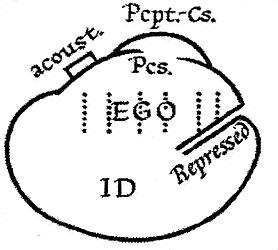Unleashing Your Inner Observer: A Journey of Self-Discovery
Written on
Chapter 1: Mapping the Mind
The human mind is a complex enigma, functioning as a finely-tuned machine that allows us, mere beings in a vast universe, to transcend our basic instincts. To better understand this intricate structure, we can draw insights from renowned psychological theories, particularly those of Sigmund Freud and Carl Jung.
Freud described the primal aspect of humanity as the "id," which embodies our instinctual drives such as hunger, fear, and desire. This raw part of us flourishes when our basic needs are met—much like a wild animal content in its territory.

Freud's work in 'The Ego and the Id' (1923) illustrates the interconnections within our psyche: “The ego is not sharply separated from the id; its lower portion merges into it…. But the repressed merges into the id as well, and is merely a part of it.” This highlights the complexity of our mental landscape.
Aligning with Freud, Carl Jung proposed that individuals harbor a range of subconscious impulses he termed the “collective unconscious.” Beyond our primal instincts lies a social persona—the curated self we present to the world.
Consider the part of you that adheres to societal norms and regulations. This is the aspect that collectively represents your identity, akin to what Freud referred to as the ego and super-ego. It serves as a moral compass, guiding you to make choices that align with societal expectations.
The civil side of our nature operates like a negotiator, striving to fulfill our desires while adhering to rules. Humans are remarkably resourceful, adept at crafting their environments and relationships.
Yet, within us exists a deeper, often overlooked essence. Some may call it the divine, while others refer to it as the higher self. Many choose to ignore this intrinsic wisdom, barreling through life without reflection.
I recognize the subtle whispers of this evolving human experience, tuning out the distractions to hear the ancient wisdom that resides within us all.
Most individuals unknowingly engage with this inner voice, which can be both enlightening and deceptive:
The observer within subtly guides the self it observes—you.
You, the Vessel
Imagine a driver's education vehicle, equipped with dual controls for both the instructor and the learner. This setup ensures safety during the learning process. Similarly, within your mind, the observer acts as a passenger, capable of influencing your journey.
While many debate the observer's role, it is largely accepted that this part of you influences most of your thoughts and actions. You are both the driver and the observer, sharing control over your life's direction.
Observing the Observer
You are also the steward of this mental vessel. Often, we inadvertently silence our inner observer when its guidance is crucial, while allowing it to dictate our actions during less significant moments.
This observer is not inherently malicious; it aims to protect you. However, its guidance can be misleading, conditioned to foster doubt and fear.
Despite believing we desire the best for ourselves, our reactions often betray this intention. The observer tends to focus on practicality, aiming for safety rather than genuine fulfillment. It may lack the capacity for empathy, favoring a cold, calculating approach to life.
Yet, awareness brings clarity.
What to Do with Fleeting Awareness
Once you recognize the observer, a transformation occurs. You begin to discern the distinction between your core self and this observing entity. Many describe this realization as unsettling yet enlightening—a glimpse into a higher state of consciousness.
Embrace this newfound awareness, for it reveals the intricate tapestry of your identity. However, be mindful not to linger too long, as the opportunity for growth may fade back into the routine of daily life.
Before your observer regains control, assert your autonomy. You can guide it to take a break or to adopt a more supportive demeanor. This inner dialogue can reshape the dynamics of your consciousness.
The observer has likely influenced your fears and limitations throughout your life, but now you hold the power to redefine its role. You are the vehicle, and you can shift the controls as needed.
Train the Driver of Your Journey
Breaking free from self-imposed limitations can be challenging, especially since many do not recognize the sources of their internal conflict. Imagine a future where you are the architect of your experiences, unburdened by past failures.
With awareness, you can reshape your journey, creating a more fulfilling existence. Take a moment to contemplate the endless possibilities that lie ahead, free from the nagging doubts that have hindered your potential.
To further explore these themes, watch the enlightening video below that delves into how to navigate interruptions in communication.
The second video, focused on self-interruptions, offers valuable insights into understanding and managing this inner dialogue.
Awareness is a profound and challenging journey. Take time to rest and reflect on the possibilities that await you in a life unencumbered by self-doubt.
Lastly, enjoy this powerful song that beautifully captures the struggle between dualities within us, offering a poignant expression of the human experience.